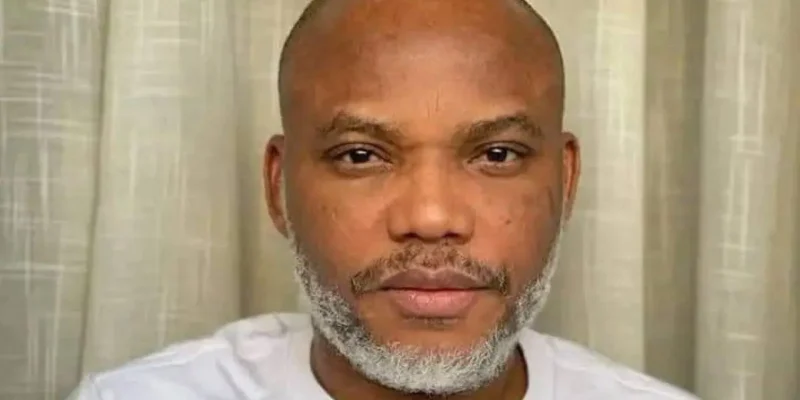
Leader of the Indigenous People of Biafra (IPOB), Nnamdi Kanu, on Wednesday told the Federal High Court in Abuja that he has no case to answer in the terrorism and treasonable felony charges filed against him by the Federal Government.
Kanu’s legal team made the announcement moments after the prosecution closed its case, having presented five witnesses and submitted several exhibits. The fifth prosecution witness, identified only as “EEE,” is an operative of the Department of State Services (DSS) and testified behind a protective screen.
After the cross-examination of PW-5 by Dr. Onyechi Ikpeazu (SAN), a member of Kanu’s defence team, the Federal Government’s lead counsel, Chief Adegboyega Awomolo (SAN), informed the court that the prosecution was satisfied with the evidence presented and would not call further witnesses.
“I will therefore, at this juncture, close the case of the prosecution,” Awomolo stated.
Responding, Chief Kanu Agabi (SAN), who leads the defence team, immediately notified the court of the defendant’s decision to file a no-case submission—an application arguing that the evidence presented by the prosecution fails to establish a prima facie case warranting a defence.
Justice James Omotosho subsequently gave both parties 14 days each to file their written addresses, with an additional two days for replies on points of law. The matter was adjourned to July 18 for the adoption of final addresses on the no-case submission.
During the day’s proceedings, the DSS operative testified that Kanu’s alleged radio broadcasts were linked to violence that occurred during the 2020 EndSARS protests. He claimed IPOB activities were connected to the deaths of 186 police officers and the destruction of 164 police stations nationwide.
The witness, who admitted to never meeting Kanu personally, said he compiled damage assessment reports and obtained death certificates of officers allegedly affected. These documents, along with a certificate of compliance, were admitted into evidence despite opposition from the defence, which promised to challenge their admissibility in the final address.
BACKGROUND
Nnamdi Kanu was first arrested on October 14, 2015, after returning from the United Kingdom. He was granted bail on health grounds in April 2017 but fled Nigeria after a military raid on his residence in Abia State.
He was re-arrested in Kenya and forcibly returned to Nigeria on June 27, 2021, a process his lawyers described as extraordinary rendition. Since then, he has been held in DSS custody.
In April 2022, the trial court struck out 8 of the 15 charges against him. The Court of Appeal later quashed the remaining charges and ordered his release in October 2022. However, the Federal Government appealed to the Supreme Court, which reversed the lower court’s decision in December 2023, allowing the continuation of Kanu’s trial on a seven-count charge.
The case continues amid heightened public interest and political implications across the country.

Comments